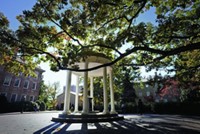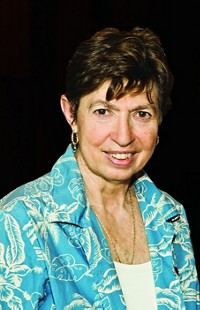Advertisement
Grab your lab coat. Let's get started
Welcome!
Welcome!
Create an account below to get 6 C&EN articles per month, receive newsletters and more - all free.
It seems this is your first time logging in online. Please enter the following information to continue.
As an ACS member you automatically get access to this site. All we need is few more details to create your reading experience.
Not you? Sign in with a different account.
Not you? Sign in with a different account.
ERROR 1
ERROR 1
ERROR 2
ERROR 2
ERROR 2
ERROR 2
ERROR 2
Password and Confirm password must match.
If you have an ACS member number, please enter it here so we can link this account to your membership. (optional)
ERROR 2
ACS values your privacy. By submitting your information, you are gaining access to C&EN and subscribing to our weekly newsletter. We use the information you provide to make your reading experience better, and we will never sell your data to third party members.
People
Marye Anne Fox
Departing UC San Diego chancellor reflects on her career, plans to focus on teaching
by Jyllian Kemsley
July 2, 2012
| A version of this story appeared in
Volume 90, Issue 27

“I’ve had the best career!” exclaims Marye Anne Fox, outgoing chancellor of the University of California, San Diego, in the midst of a day that includes meetings on the university budget, commencement, racial tensions on campus, and a new stem cell research building, as well as on how to handle whistle-blower complaints. “It’s far exceeded anything I ever anticipated.”
Her career has, indeed, far exceeded anything most chemists could anticipate. After earning a B.S. in chemistry from South Euclid, Ohio’s Notre Dame College in 1969, she went on to get her Ph.D. from Dartmouth College in 1974. After a two-year postdoc at the University of Maryland, she joined the faculty of the University of Texas, Austin, where her research centered on organic photochemistry and electrochemistry.
She then rose through the professorial ranks at UT Austin and became vice president for research in 1994. In 1998, she moved to become chancellor of North Carolina State University. In 2004, she moved again to lead UCSD. Included in her many awards and honors is the National Medal of Science, which she received from President Barack Obama in 2010.
Fox, now 64, credits the launch of Sputnik and the ensuing space race between the U.S. and Soviet Union for facilitating her interest in science during her high school and college years. “If you weren’t choosing to be a scientist or a mathematician or an engineer, you at least considered it”—even the girls, she says.
Further down the road, she says the support of her graduate school adviser, Dartmouth chemistry professor David M. Lemal, was crucial for enabling her to keep working through pregnancy and the birth of her first child. “My parents thought I should quit,” Fox says. But Lemal accommodated the schedule she needed to combine parenthood and graduate research.
Fox believes that similarly strong, supportive mentorship continues to be especially critical for women to succeed in academic science. She says it’s particularly important for advisers to help their trainees build self-confidence and maintain it when challenged. For that, she says, professors need to be “a little more sociable and less critical”—something that she learned from her own mentors as well as from “countermentors,” who lacked social skills.
At UT Austin, it was fellow chemistry professor Norman Hackerman who guided Fox into advisory and leadership positions, she says. After serving as president of UT Austin and then Rice University, Hackerman returned to Austin’s chemistry department in 1985. He recruited the newly tenured Fox to serve on National Academies committees, setting her on a path that led to service on the National Science Foundation’s National Science Board and into university administration.
Reflecting on her time as chancellor of UCSD, Fox says she is particularly proud of expanding the university’s infrastructure by 40%, or 3.5 million sq ft, to add space for student services and housing, as well as facilities for student life, teaching, and research. Examples include the Skaggs School of Pharmacy & Pharmaceutical Sciences and the California Institute for Telecommunications & Information Technology, which has space dedicated to interdepartmental collaborative work. Fox also completed a capital campaign that raised more than $1 billion for the university.
She has had some disappointments: Fox wanted to integrate the private California Western School of Law into UCSD, but that effort is still in progress. Also, in trying to demolish and rebuild the structurally deficient chancellor’s house and associated meetings facility, she ran into trouble over a Native American burial site on the property. “I have the privilege right now of being sued by both sides,” she says, because a Native American group wants to repatriate artifacts and UCSD faculty want to retain them.
As chancellor, Fox stayed involved in research by collaborating with her husband, UCSD chemistry professor James K. Whitesell. After she steps down as chancellor at the end of this month, Fox plans to wind down her research and focus on teaching. “It would cost at least $1 million to reestablish my research group at the cutting edge,” she says, and she couldn’t justify making that investment given her age and the postrecession budget pressures facing the university.
Instead, Fox is looking forward to getting back into the classroom. Over her career, she’s taught at every level, from elementary school through Ph.D. programs, and “I loved it all,” she says. First, however, she’s taking a year to focus on pedagogy in science, math, and engineering and how to improve the training and development of teachers through programs such as CalTeach, which recruits and trains science and math teachers, and UCSD’s Center for Research on Educational Equity, Assessment & Teaching Excellence. Teaching should be “more prominently held up as an honorable, necessary, and valued profession,” and teachers at all levels need more support in refining their craft, Fox says.
MORE ON THIS STORY
Public Universities In Peril
California Crunch
Marye Anne Fox







Join the conversation
Contact the reporter
Submit a Letter to the Editor for publication
Engage with us on Twitter